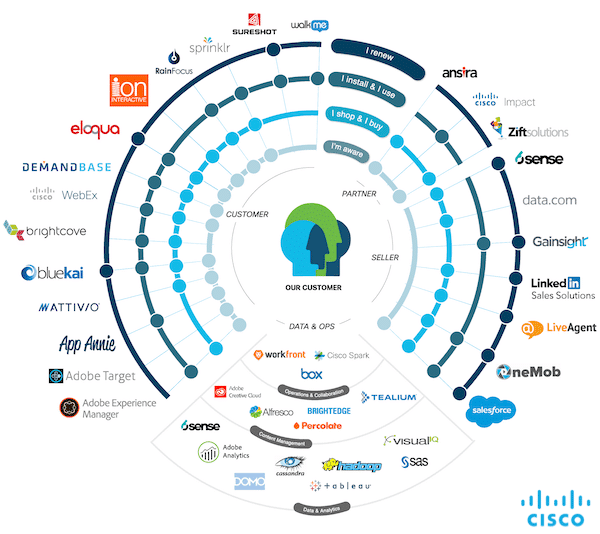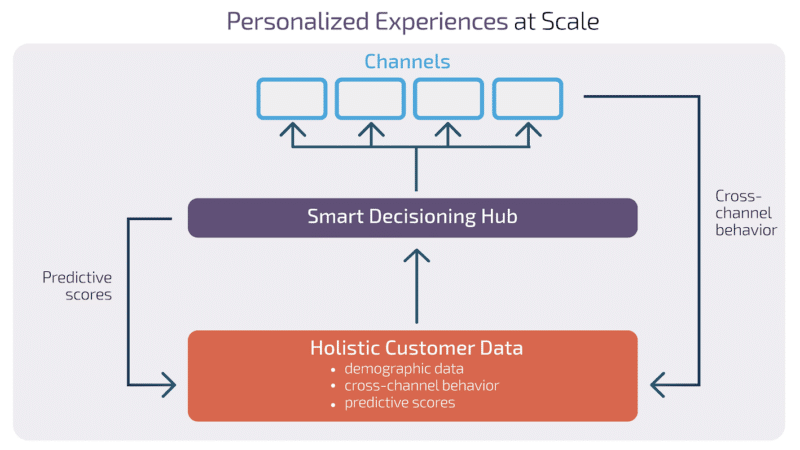
4 Trends You Need to Know on Martech’s Evolution
Technology should make life easier, not harder. So far, martech tools have delivered in both directions. While some tools empower marketing departments to accomplish more with fewer resources, many would-be miracle cures only lead to more headaches.
Fortunately, martech has begun to mature. A few years ago, the landscape was doubling or tripling annually; last year, it grew by just 36%. As the dust settles, the arc of its evolution is becoming clear.
Quick Takeaways:
- AI is no longer the one technological solution to all problems as it was touted in its early days.
- The market for SaaS tools has matured. The major ones are finding their niches and getting better at specialized functions.
- Personalization is now a core part of content marketing.
- Companies have finally realized the importance of sales-marketing alignment.
1. AI and machine learning are losing their power as selling points
In martech’s early days, companies touted the AI and machine learning technologies that made their tools tick. Look at the ad campaigns around leading ones today, though, and you’ll notice that they play up capabilities rather than components.
Actionable real-time insights are becoming the new gold standard. Integrations with popular sales tools matter more than ever. Especially as martech spending grows, usability is an increasing concern. Marketers are interested in what their martech tools can do for them—not necessarily how they do it. AI and machine learning technologies are no longer primary differentiators, and customers are prioritizing outcomes instead of flashy tech.

That isn’t to say, though, that AI won’t continue to make tools more capable. Even as martech providers mention it less, they’ll keep refining their algorithms. Martech algorithms will make better predictions about customer behavior, create new automation opportunities, and shine more light on where marketers’ opportunities lie.
2. Tools are becoming more specialized
As martech tools grow in capability, it becomes easier to confuse them. This is already evident in areas like customer data platforms (CDPs) and data management platforms (DMPs).
Despite their similar names, the tools do different things. CDPs store data on known customers and are used for a wide range of real-time marketing activities. In order to build rich profiles, they collect data and user activity information to understand context and drive personalized interactions. DMPs, on the other hand, are mainly meant for customer acquisition. Marketers use DMPs to store anonymized third-party data in order to develop lookalike audiences and target ads.
As complexity of the martech landscape grows, identifying how and when to add a new tool has become more difficult. “It’s important to use a holistic reference architecture to help understand their current state and develop an actionable roadmap,” says Phil Lockhart, partner and chief digital officer at management and technology consultancy Credera. “This helps identify clear long-term sequencing as well as immediate next best steps.” Maximizing a martech investment means fitting tools together in creative and effective ways.
3. Personalization is improving
Not that long ago, customizing the greeting of marketing emails was considered cutting-edge. Sending a coupon on the customer’s birthday was seen as the height of customer experience.
Martech has become much more capable. Some tools can now recommend email copy tailored to each recipient’s communication style. Others pull together data from mobile, desktop, and even offline sources to make better predictions about where the customer is in the buying cycle.

Expect personalization to be a hotspot for martech’s evolution. As the customer’s experience becomes increasingly important, martech tools will make more intelligent assumptions. If music lovers are talking about an upcoming festival on social media, for instance, martech tools may help music brands like Spotify develop individualized content around the artists that users mention.
4. The divide between sales and marketing tech is shrinking
Sales technology got an earlier start than martech. When Salesforce kicked off the sales tech revolution in the 2000s, many marketers had yet to make the switch from gut-driven see-what-sticks campaigns.
Because sales and marketing technologies were developed at different times, early tools didn’t exactly invite collaboration between the two teams. Thanks in part to B2B tactics like account-based marketing, users are now insisting that integrations improve.
But developing new APIs is only half the battle. “Companies must aim to optimize the relationship between sales and marketing teams and re-frame the ways they think about each other,” explains Rashmi Vittal, CMO at sales software firm Conversica.
Building trust and improving communication take time. But martech’s evolution is catapulting marketers into closer proximity with their sales co-workers, and the teams that learn to work in harmony will see the strongest results.
You may feel ready to enter the next decade with your existing martech knowledge, but don’t get too comfortable. The only constant is change. As new types of martech emerge and existing ones become more robust, how will expectations for marketers shift? How will they affect the customer’s experience?
Keep learning, and don’t sleep on new developments as martech continues to evolve. If you want to stay at the front of the pack, you can’t sit on the sidelines while others push their limits.






